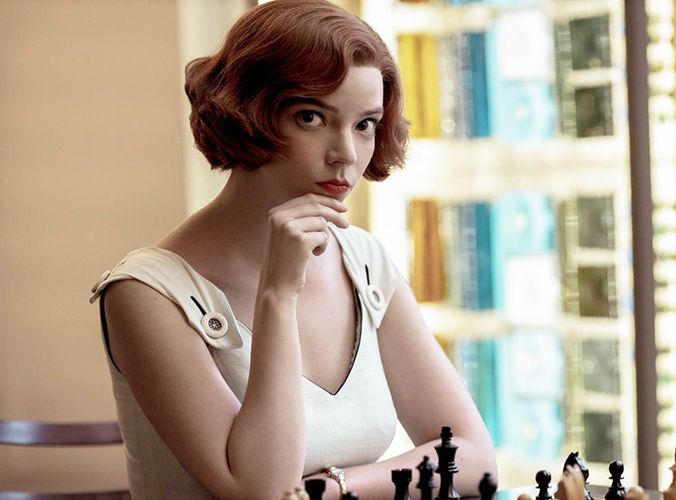Beth Harmon (also known as Elizabeth Harmon) is a fictional character from the American novel ‘The Queen’s Gambit’ (1983) by American novelist Walter Tevis. The novel was adapted for the 2020 Netflix miniseries of the same name.
The Book
The Queen’s Gambit was written by the novelist and short-story writer Walter Tevis. The book was published by Random House in 1983. The book is a bildungsroman and coming of age story, focussing on issues like feminism, drug addiction, and alcoholism. It features the life of fictional female chess prodigy Beth Harmon.

The Series
The Queen’s Gambit, a 2020 American coming-of-age period drama miniseries based on Walter Tevis’s 1983 novel of the same name, featured the story of Beth Harmon. The series is written and directed by American filmmaker and author Scott Frank with producer and screenwriter Allan Scott. It is a seven-episode series starring Argentine-British actress Anya Taylor-Joy in the lead role of Beth. Beth’s younger versions are played by the American child artists Isla Johnston (teen Beth) and Annabeth Kelly (five-year-old Beth). The series aired on Netflix on October 23, 2020.

The series is the first adaption of the book. However, the first attempt at adaption was made with the script by the author, journalist, and screenwriter Jesse Kornbluth, and later with Heath Ledger (who was battling addiction and was a chess whiz himself) who was preparing to make his directorial debut in a feature film before his death in 2008.
Wiki/Biography & Career
Beth Harmon is a Kentucky-based chess prodigy who ruled the male-dominant game (of Chess) in the 1950s and 60s. She was sent to a female Christian orphanage Methuen Home in Mount Sterling after her mother died in a traffic collision; she was eight years old then. At the orphanage, the children were given green pills, which according to the book, were tranquilizers given to her twice a day to help her doze away her tension in the orphanage. She was good at mathematics, history, and science. One day, she was sent to the basement to clean blackboard erasers when she witnessed the janitor William Shaibel playing alone with the green-and-white checkered board. Later, it was Shaibel who introduced the game of chess to her. After Shaibel refused to teach her because she was a girl, she started learning how to play chess and began hallucinating (because of excessive dosage of green pills) of the chessboard on her room’s ceiling, where she played chess in her mind. Her addiction grew with time. However, after a match with Shaibel (which she lost), she began playing with him more and learned new tactics.

Beth Harmon (played by Isla Johnston) playing chess with William Shaibel (played by Bill Camp) in a scene from The Queen’s Gambit (2020)
Sometime in the future, she had a match with the twelve players of the Duncan High School of Mr. Ganz, who had earlier lost to Beth in the basement. Before the match, she started experiencing withdrawal symptoms because she could not get the pills due to the passing of the new state law on the ban of the administration of tranquilizers to children. That day, she won the match against the twelve after Jolene, a fellow black orphan girl and her friend, gave Beth her last two pills.

Beth Harmon (played by Isla Johnston) with Jolene (played by Moses Ingram) in a scene from The Queen’s Gambit (2020)
However, her addiction began conflicting with her everyday life. It was also the time when she played her first chess tournament and garnered local fame. Three years after her adoption in 1963, she participated in the US Championship and was dubbed the US co-champion. She graduated high school from Fairfield High School in Kentucky. She won many chess tournaments including Las Vegas U.S. Open Chess Championship (1966), Moscow Invitational (1968), and Kentucky State Championships. Although she was a star in chess, her biggest fear was Vasily Borgov, Soviet-Russian world champion chess player and Beth’s strongest competitor. Her ultimate goal was to defeat Borgov but met with failure whenever they were up against each other. Towards the end of the story, she participated in Moscow International, where she played her final game against Borgov and defeated him after refusing a draw offer.

Beth Harmon (played by Anya Taylor-Joy) playing chess with Vasily Borgov (played by Marcin Dorociński) in a scene from The Queen’s Gambit (2020)
Physical Appearance
Height (approx.): 5′ 7″
Eye Color: Hazel
Hair Color: Auburn

Family & Relationships
Parents & Siblings
Her mother’s name is Alice Harmon and her father’s name is Paul. In 1963, she was adopted by Alma and Allston Wheatley during her teens. The Wheatley family adopted her because Alma had lost her child before she adopted Beth. The loss of the child was traumatic for Alma as she resorted to alcohol, which later resulted in Beth’s alcoholism.

Beth Harmon (played by Isla Johnston) with Alma Wheatley (played by Marielle Heller) in a scene from The Queen’s Gambit (2020)

Allston Wheatley (Patrick Kennedy) in a scene from The Queen’s Gambit (2020)
Relationships
She developed an intimate relationship with Harry Beltik, who she parted ways with later.

Beth Harmon (played by Anya Taylor-Joy) with Harry Beltik (played by Harry Melling) in a scene from The Queen’s Gambit (2020)
She also indulged in one night stand with Benny Watts, who tutored her in Chess after she discovered weaknesses in her play. Under Benny, she discovered that she could play without sedatives.

Beth Harmon (played by Anya Taylor-Joy) with Benny Watts (played by Thomas Brodie-Sangster) in a scene from The Queen’s Gambit (2020)
At the end of the book, she remains single. She was also involved with D.L. Townes (a fellow chess player and journalist).

Beth Harmon (played by Anya Taylor-Joy) with D.L. Townes (played by Jacob Fortune-Lloyd) in a scene from The Queen’s Gambit (2020)
Real Life Adaptations
After the Netflix series became a hit, many started to wonder about whether Beth Harmon was real or not. Although the writer himself never talked about the inspiration for Beth’s character, many speculations have been made on who could Beth possibly be.
The Author: Himself

Walter Tevis
Walter Tevis was born in 1928 in San Francisco, California. He grew up in Kentucky, the same place where The Queen’s Gambit is based. Near the end of World War II, he served in the Pacific Theater as a Navy carpenter’s mate onboard the USS Hamilton. After receiving his Master of Arts degree in English Literature from the University of Kentucky, he wrote many short stories, which were published in many newspapers and magazines. In 1959, his first novel The Hustler was published. After the release of the book The Queen’s Gambit, Walter Tevis gave an interview to The New York Times. In an interview, he admitted that parts of the story are pulled from his real-life experiences of playing chess. In the 1980s, he first started playing chess against his sister and neighborhood kids; he was ranked a Class C player (amateur ranking starts with A and goes down the alphabet). He might not have reached Beth’s level, but according to him,
I first began to play chess with my sister and the kids on my block. I once won a prize of $250 and became a Class C player. I now play against a computer so I don’t have to face a real-life opponent sneering at me—I can always pull out the plug. I’ve played well enough to know what a good game is. I can beat the average person, but I’m afraid to play those guys who set up boards in the street on Broadway.”
The drug angle in the story also came from his real-life struggle with drugs. According to him,
When I was young, I was diagnosed as having a rheumatic heart and given heavy drug doses in a hospital. That’s where Beth’s drug dependency comes from in the novel, Writing about her was purgative. There was some pain—I did a lot of dreaming while writing that part of the story. But artistically, I didn’t allow myself to be self-indulgent.”
In another interview with the San Francisco Examiner, he further explained his experience with drug addiction, saying that he was given phenobarbital three times a day; he was recovering from his heart condition in a convalescent home. He further said,
I loved it. … That may be one reason I became a drunk”
Years later, he resorted to chess as a distraction while coping up with his alcoholism. He said,
I think that most people take up the game of chess in a very serious way if they have personality problems. When they’re trying to stay away from something else in life. Y’know, getting rid of some of that anxiety by displacing it in something that was relatively safe.”
According to him, Beth’s character was a tribute to brainy women including his daughter, Julie, and aunt, who gave him his first chess as a present when he was seven. Talking about Beth, he said,
I like Beth for her bravery and intelligence. In the past, many women have had to hide their brains, but not today”
Vera Menchik

Vera Menchik
Vera Menchik was born in the winter of 1906 in Moscow in a prosperous family who owned a mill. During the Russian Revolution (1917-23), her family found itself in the middle of civil war as her family’s mill was confiscated. The family had to share their house with other people, and eventually, lost its ownership. Vera was forced to switch schools. In her words,
During the winter of 1919-20 the school I attended was for some time without water, heating or electric light, yet the classes went on and the students, clad in their fur-lined coats and hats, read by the light of a few flickering candles or an oil lamp, and then perhaps had an hour’s walk home through the snow, for all traffic stopped after working hours.”
For her inner comfort, she turned to chess, a game that was taught to her by her father when she was nine years old. As if the Russian revolution wasn’t enough, she was left devastated after her parents divorced, leaving Vera and her sister, Olga, moving to England with their mother, a native of the state. In England, she joined a local chess club and took private lessons, as she challenged the best men players of that time. In her letter to Chess Magazine, she wrote,
I have often been asked, what made me think seriously about chess? It would appear that the atmosphere of silence and heavy smoking is not appropriate for a young lady. That’s true! In other life circumstances, it would not occur to me to spend time in such a way, but chess is a quiet game and therefore the best hobby for a person who cannot speak the language properly.”
She excelled from being the first in local and regional matches to national and international. She won the first Women’s World Chess Championship, which was held in 1927. After she kept on winning against women, she set her goals for men’s tournaments, winning against them. In 1929, at 23, she created an international stir when she tied Akiba Rubenstein, a Polish grandmaster. Later that year, she played in what Chess Magazine called “the strongest chess tournament since the end of World War I.” At the event, the top Austrian player Albert Becker suggested forming a club named after Vera; ones who lose would become a member while the ones who draw would become candidates for membership. Albert was the first one to join the club as the event recorded extensive media coverage around the world.

Vera Menchik playing chess
Her husband died in 1943, and a year later, at the height of the Second World War, while playing in a chess tournament, her life was claimed by the war.
Bobby Fischer

Bobby Fischer
In the acknowledgment of The Queen’s Gambit, the author of the book Walter Tevis wrote that he was inspired by the grandmasters Robert Fischer, Boris Spassky, and Anatoly Karpov, all of whom were active during the chess scene in the ’60s. Bobby Fischer is one of the chess prodigy’s whose story goes hand-in-hand with Beth’s character in the novel. Bobby Fischer was born in 1943 in Chicago, Illinois. The chess expert Dylan Loeb McClain pointed out the similarities between Beth and Bobby in an article in The New York Times. According to him,
Beth and Fischer have similar, aggressive playing styles and when playing white and facing the Sicilian Defense, they both play the same system: the Fischer-Sozin Attack.”
At a young age, both of them won the U.S. championship title.

Childhood picture of Bobby Fischer playing chess
As teens, they started supporting themselves, learned Russian to compete against Soviet chess players, spent excessively on fancy clothes, and made their living out of playing chess (a very rare feat). Interestingly, the book Modern Chess Openings that Beth received from Shaibel when she began playing chess was co-authored by Jack Collins, who was Fischer’s early mentor.
Categories: Biography
Source: SCHOOL TRANG DAI




